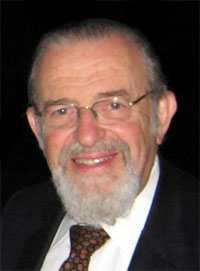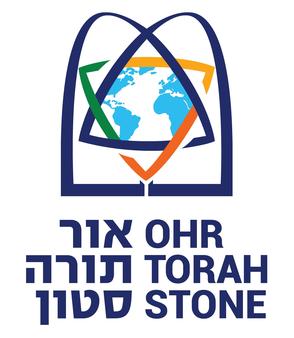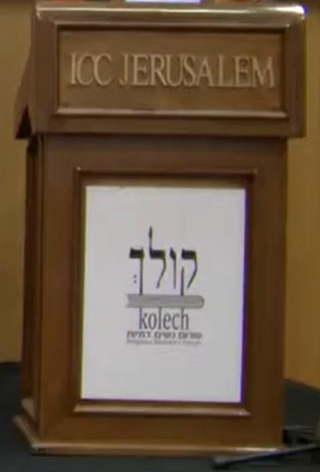
Judaism is an Abrahamic, monotheistic, and ethnic religion. It comprises the collective spiritual, cultural, and legal traditions of the Jewish people, having originated as an organized religion in the Middle East during the Bronze Age. Contemporary Judaism evolved from Yahwism, the cultic religious movement of ancient Israel and Judah, around the 6th/5th century BCE, and is thus considered to be one of the oldest monotheistic religions. Religious Jews regard Judaism as their means of observing the Mosaic covenant, which was established between God and the Israelites, their ancestors. Jewish religious doctrine encompasses a wide body of texts, practices, theological positions, and forms of organization.

The subject of homosexuality and Judaism dates back to the Torah. The book of Vayikra (Leviticus) is traditionally regarded as classifying sexual intercourse between males as a to'eivah that can be subject to capital punishment by the current Sanhedrin under halakha.

The role of women in Judaism is determined by the Hebrew Bible, the Oral Law, by custom, and by cultural factors. Although the Hebrew Bible and rabbinic literature mention various female role models, religious law treats women differently in various circumstances. According to a 2017 study by the Pew Research Center, women are slightly more likely to identify with Judaism. They account for 52% of the worldwide Jewish population.
A rabbi is a spiritual leader or religious teacher in Judaism. One becomes a rabbi by being ordained by another rabbi—known as semikha—following a course of study of Jewish history and texts such as the Talmud. The basic form of the rabbi developed in the Pharisaic and Talmudic eras, when learned teachers assembled to codify Judaism's written and oral laws. The title "rabbi" was first used in the first century CE. In more recent centuries, the duties of a rabbi became increasingly influenced by the duties of the Protestant Christian minister, hence the title "pulpit rabbis", and in 19th-century Germany and the United States rabbinic activities including sermons, pastoral counseling, and representing the community to the outside, all increased in importance.

The Jewish Theological Seminary (JTS) is a Conservative Jewish education organization in New York City, New York. It is one of the academic and spiritual centers of Conservative Judaism and a center for academic scholarship in Jewish studies. The Jewish Theological Seminary Library is one of the most significant collections of Judaica in the world.

Yeshiva Rabbi Chaim Berlin or Yeshivas Rabbeinu Chaim Berlin is an American Haredi Lithuanian-type boys' and men's yeshiva in Brooklyn, New York.
A niddah, in traditional Judaism, is a woman who has experienced a uterine discharge of blood, or a woman who has menstruated and not yet completed the associated requirement of immersion in a mikveh.

Norman Lamm was an American Modern Orthodox rabbi, scholar, academic administrator, author, and Jewish community leader. He was the Chancellor of Yeshiva University until he announced his retirement on July 1, 2013.

Shlomo Riskin is an Orthodox rabbi, and the founding rabbi of Lincoln Square Synagogue on the Upper West Side of New York City, which he led for 20 years; founding chief rabbi of the Israeli settlement of Efrat in the Israeli-occupied West Bank; former dean of Manhattan Day School in New York City; and founder and Chancellor of the Ohr Torah Stone Institutions, a network of high schools, colleges, and graduate Programs in the United States and Israel.
Jewish leadership has evolved over time. Since the destruction of the Second Temple in Jerusalem in 70 CE, there has been no single body that has a leadership position over the entire Jewish diaspora. Various branches of Judaism, as well as Jewish religious or secular communities and political movements around the world elect or appoint their governing bodies, often subdivided by country or region.

Rabbinic authority in Judaism relates to the theological and communal authority attributed to rabbis and their pronouncements in matters of Jewish law. The extent of rabbinic authority differs by various Jewish groups and denominations throughout history.
Jewish feminism is a movement that seeks to make the religious, legal, and social status of Jewish women equal to that of Jewish men in Judaism. Feminist movements, with varying approaches and successes, have opened up within all major branches of the Jewish religion.
Daniel Boyarin is an Israeli-American historian of religion. Born in New Jersey, he holds dual United States and Israeli citizenship. He is the Hermann P. and Sophia Taubman Professor of Talmudic Culture in the Departments of Near Eastern Studies and Rhetoric at the University of California, Berkeley. He is married to Chava Boyarin, a lecturer in Hebrew at UC Berkeley. They have two sons. His brother, Jonathan Boyarin, is also a scholar, and the two have written together. He has defined himself as a "diasporic rabbinic Jew".

Women rabbis are individual Jewish women who have studied Jewish Law and received rabbinical ordination. Women rabbis are prominent in Progressive Jewish denominations, however, the subject of women rabbis in Orthodox Judaism is more complex. Although Orthodox women have been ordained as rabbis, many major Orthodox Jewish communities and institutions do not accept the change. In an alternative approach, other Orthodox Jewish institutions train women as Torah scholars for various Jewish religious leadership roles. These roles typically involve training women as religious authorities in Jewish Law but without formal rabbinic ordination, instead, alternate titles are used. Yet, despite this alteration in title, these women are often perceived as equivalent to ordained rabbis. Since the 1970s, over 1,200 Jewish women have been ordained as rabbis.

Yitzhak Yosef is the Sephardi Chief Rabbi of Israel, the rosh yeshiva of Yeshivat Hazon Ovadia, and the author of a set of books on halakha called Yalkut Yosef.
Orthodox Jewish feminism is a movement in Orthodox Judaism which seeks to further the cause of a more egalitarian approach to Jewish practice within the bounds of Jewish Law. The major organizations of this movement is the Jewish Orthodox Feminist Alliance (JOFA) in North America, and Women of the Wall (WOW) and its affiliates in Israel and internationally, known as The International Committee for Women of the Wall (ICWOW). In Israel, the leading Orthodox feminist organization is Kolech, founded by Dr. Chana Kehat. In Australia, there is one Orthodox partnership minyan, Shira Hadasha, in Melbourne.

The Center for Jewish–Christian Understanding and Cooperation or CJCUC is an educational institution at which Christians who tour Israel can study the Hebrew Bible with Orthodox rabbis and learn about the Hebraic roots of Christianity. The center was established in Efrat in 2008 by Rabbi Dr. Shlomo Riskin, who has been described as "the most prominent rabbinic spokesperson to Christian Zionists". CJCUC partners with major Christian interfaith organizations such as Christians United for Israel and the International Christian Embassy Jerusalem. Since Riskin's retirement as president of Ohr Torah Stone in 2018, the overseeing of all CJCUC activities has been turned over to David Nekrutman who has served as the center's chief director since its inception.

Ohr Torah Stone (OTS) is an international Modern Orthodox movement that aims to develop Jewish life, learning, and leadership. The organization is led by Rabbi Dr. Kenneth Brander. In 1983 OTS was founded by Rabbi Dr. Shlomo Riskin. As of 2020 OTS included 27 educational institutions under its auspices.

Kolech, also known as Kolech: Religious Women's Forum, is an Israeli women's organization associated with Orthodox Judaism. The group's stance is aligned with Orthodox Jewish feminism and religious Zionism.













